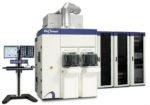The Linley Group held its Fall Processor Conference 2021 last week. There were a number of very informative talks from various companies updating the audience on the latest research and development work happening in the industry. The presentations were categorized as per their focus, under eight different sessions. The sessions… Read More
 2026 Outlook with Richard Hegberg of Caspia TechnologiesTell us a little bit about yourself and…Read More
2026 Outlook with Richard Hegberg of Caspia TechnologiesTell us a little bit about yourself and…Read More Siemens EDA Illuminates the Complexity of PCB DesignAs heterogeneous multi-die design becomes more prevalent, the…Read More
Siemens EDA Illuminates the Complexity of PCB DesignAs heterogeneous multi-die design becomes more prevalent, the…Read More Accelerating Advanced FPGA-Based SoC Prototyping With S2CHaving spent a significant amount of my career…Read More
Accelerating Advanced FPGA-Based SoC Prototyping With S2CHaving spent a significant amount of my career…Read More Verification Futures with Bronco AI Agents for DV DebugVerification has become the dominant bottleneck in modern…Read More
Verification Futures with Bronco AI Agents for DV DebugVerification has become the dominant bottleneck in modern…Read MoreS2C EDA Delivers on Plan to Scale-Up FPGA Prototyping Platforms to Billions of Gates
S2C has been a global leader in FPGA prototyping for nearly two decades now, and its FPGA prototyping platforms have closely tracked the availability of the latest FPGAs – including the latest FPGAs from both Xilinx and Intel. And they are definitely delivering on the promise to advance their prototyping solutions for hyperscale… Read More
Thick Data vs. Big Data
One of the challenges facing businesses in post-COVID-19 world is the fact that consumer behavior won’t go back to pre-pandemic norms. Consumers will purchase more goods and services online, and increasing numbers of people will work remotely just to mention few major changes . As companies begin to navigate the post-COVID-19… Read More
GM’s Postcard from Fantasyland
In the midst of what may well be the greatest electric vehicle debacle of the nascent EV era, General Motors put on a happy face telling investors two weeks ago that all things EV and autonomous were going swimmingly to plan with gumdrops and sugar plums coming on the road ahead. GM claimed before-end-of-year availability for the… Read More
Podcast EP46: Arteris IP – the role and impact of system IP
Dan is joined by industry veteran Charlie Janac, chairman, president and CEO of Arteris IP. Dan explores the various products that comprise system IP with Charlie, including the high growth markets he sees. Dan and Charlie also have an interesting discussion about autonomous driving – when and how it will likely be deployed… Read More
CEO Update: Tuomas Hollman, Minima Processor CEO
Tuomas Hollman is an experienced senior executive, with proficiency that ranges from strategy to product development and business management. He began his semiconductor industry career at Texas Instruments, serving for 15 years in increasingly important roles, including general management and profit and loss responsibility… Read More
Cliosoft Webinar: What’s Needed for Next Generation IP-Based Digital Design
There’s plenty of talk about requirements for IP data management. The fundamental methods to prevent chaos, waste or worse are popular topics. I’ve covered webinars from Cliosoft on the topic on SemiWiki. But what about the future? What’s really needed to set up a path that scales, addressing the challenges of today and the new … Read More
KLAC- Foundry/Logic Drives Outperformance- No Supply Chain Woes- Nice Beat
KLA- great quarter driven by continued strong foundry/logic
No supply chain hiccups- Riding high in the cycle
Wafer inspection remains driver with rest along for the ride
Financials remain best in industry
A superb quarter
There was little to complain about in the quarter. Revenues of $2.1B and EPS of $4.64, both nicely beating… Read More
Five Reasons Why a High Performance Reconfigurable SmartNIC Demands a 2D NoC
As part of their webinar series, SemiWiki hosted one in June with the title “Five Reasons Why a High Performance Reconfigurable SmartNIC Demands a 2D NoC.” The talk by given by Scott Schweitzer, Sr. Manager, Product Planning at Achronix. Scott is a lifelong technology evangelist and focuses on recognizing technology trends and… Read More
Alchip Reveals How to Extend Moore’s Law at TSMC OIP Ecosystem Forum
The TSMC Open Innovation Platform (OIP) event brings together a wide array of companies reporting cutting edge work that are part of TSMC’s rather substantial ecosystem. The event covers everything from high-performance computing to mobile, automotive, IoT, RF and 3D IC design. Of particular interest for this post is a presentation… Read More












AI Bubble?